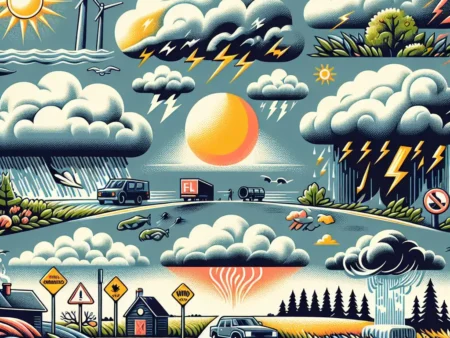Waspadai cuaca ekstrem dengan peringatan BMKG. Penting untuk mengikuti informasi terkini untuk keselamatan.
Waspadai Cuaca Ekstrem: Mengenal Peringatan dari BMKG
-
Table of Contents
- Introduction
- The Role of BMKG
- 1. Weather Monitoring
- 2. Early Warning Systems
- 3. Collaboration with International Agencies
- Types of Extreme Weather
- 1. Heavy Rainfall and Floods
- 2. Droughts and Water Scarcity
- 3. Tropical Cyclones
- Understanding BMKG Warnings
- 1. Weather Advisory
- 2. Weather Warnings
- 3. Disaster Warnings
- Responding to Extreme Weather Warnings
- 1. Stay Informed
- 2. Prepare an Emergency Kit
- 3. Follow Official Instructions
- Conclusion
Introduction

Extreme weather events have become increasingly common in recent years, posing significant risks to communities and economies around the world. In Indonesia, the Meteorology, Climatology, and Geophysics Agency (BMKG) plays a crucial role in monitoring and issuing warnings for extreme weather conditions. This article aims to explore the importance of being aware of extreme weather and understanding the warning systems provided by BMKG.
The Role of BMKG
1. Weather Monitoring
BMKG is responsible for monitoring weather conditions across Indonesia. With a vast network of weather stations and advanced technology, they collect data on temperature, humidity, wind speed, and precipitation. This data is crucial for understanding weather patterns and identifying potential extreme weather events.
2. Early Warning Systems
One of the primary functions of BMKG is to issue early warnings for extreme weather events. These warnings are crucial for individuals, communities, and government agencies to take necessary precautions and mitigate potential risks. BMKG utilizes various tools and technologies to forecast and predict extreme weather conditions accurately.
3. Collaboration with International Agencies
BMKG collaborates with international meteorological agencies to enhance their forecasting capabilities. By sharing data and expertise, they can improve the accuracy of weather predictions and provide more reliable warnings for extreme weather events. This collaboration is particularly important for Indonesia, as the country is prone to various weather-related disasters such as floods, droughts, and tropical cyclones.
Types of Extreme Weather
1. Heavy Rainfall and Floods
Indonesia experiences heavy rainfall throughout the year, especially during the monsoon seasons. This often leads to flooding, which can cause significant damage to infrastructure, homes, and agriculture. BMKG issues warnings for heavy rainfall and provides flood forecasts to help communities prepare and respond effectively.
2. Droughts and Water Scarcity
While heavy rainfall can cause floods, Indonesia also faces periods of drought and water scarcity. These conditions can have severe consequences for agriculture, water supply, and public health. BMKG monitors rainfall patterns and issues drought warnings to alert communities and government agencies to take appropriate measures.
3. Tropical Cyclones
Indonesia is located in the Pacific Ring of Fire, making it prone to tropical cyclones. These powerful storms can cause extensive damage through strong winds, heavy rainfall, and storm surges. BMKG closely monitors tropical cyclones and issues warnings to coastal areas, enabling residents to evacuate and take necessary precautions.
Understanding BMKG Warnings
1. Weather Advisory
Weather advisories are issued by BMKG to inform the public about potential weather disturbances. These advisories provide general information about expected weather conditions and serve as an early indication of possible extreme weather events. It is essential to stay updated with weather advisories to be prepared for any changes in weather patterns.
2. Weather Warnings
Weather warnings are more specific and indicate the likelihood of extreme weather events occurring within a particular area. BMKG issues warnings for heavy rainfall, strong winds, thunderstorms, and other severe weather conditions. These warnings help individuals and communities take necessary precautions to protect themselves and their properties.
3. Disaster Warnings
In cases of imminent or ongoing disasters, BMKG issues disaster warnings to alert the public and relevant authorities. These warnings are crucial for evacuation efforts and emergency response planning. BMKG collaborates with other disaster management agencies to ensure timely and accurate warnings are disseminated to those at risk.
Responding to Extreme Weather Warnings
1. Stay Informed
It is crucial to stay informed about weather conditions and warnings issued by BMKG. Regularly check weather updates through official channels, such as BMKG’s website, social media accounts, or local news outlets. Being aware of potential extreme weather events allows individuals and communities to take necessary precautions.
2. Prepare an Emergency Kit
Preparing an emergency kit is essential to ensure you have necessary supplies in case of extreme weather events. Include items such as non-perishable food, water, flashlights, batteries, a first aid kit, and important documents. Having an emergency kit ready can significantly help during evacuation or when access to basic necessities is limited.
3. Follow Official Instructions
During extreme weather events, it is crucial to follow official instructions and guidelines provided by BMKG and local authorities. If evacuation orders are issued, promptly follow them to ensure your safety and the safety of others. Ignoring official instructions can put lives at risk and hinder emergency response efforts.
Conclusion
Being aware of extreme weather conditions and understanding the warning systems provided by BMKG is crucial for the safety and well-being of individuals and communities in Indonesia. BMKG plays a vital role in monitoring weather patterns, issuing early warnings, and collaborating with international agencies. By staying informed, preparing for emergencies, and following official instructions, we can mitigate the risks associated with extreme weather events and protect ourselves and our communities. Remember, being prepared is the key to staying safe in the face of unpredictable weather conditions.







